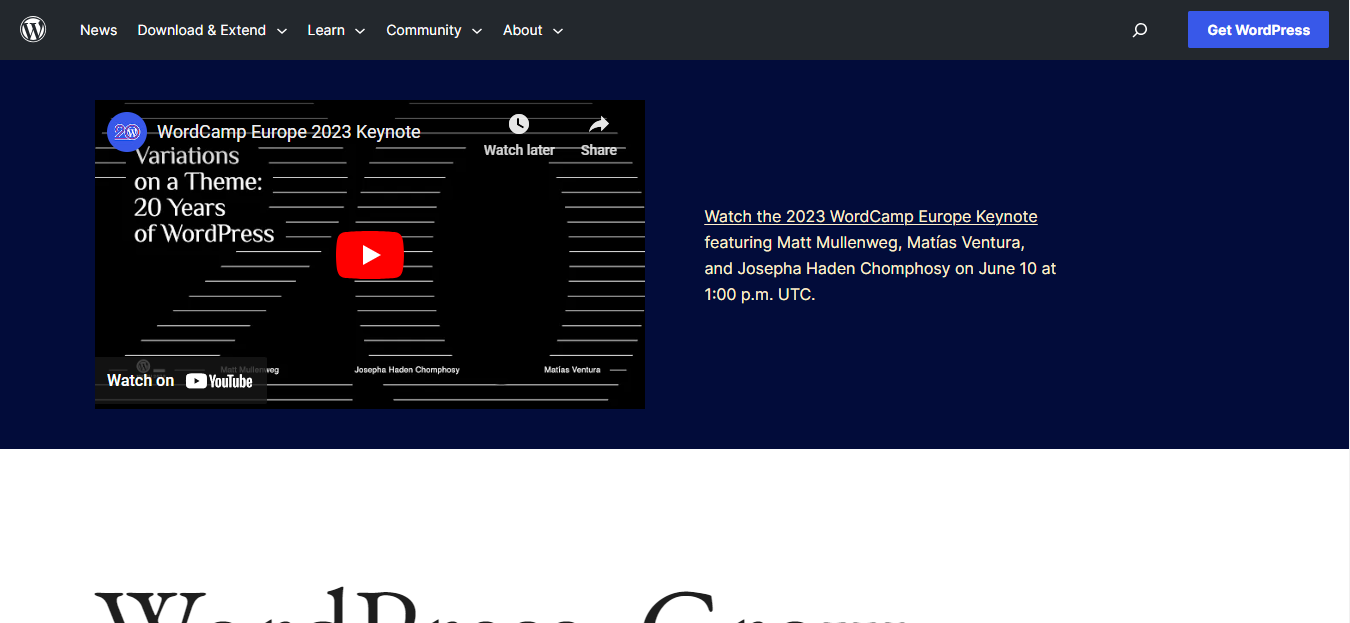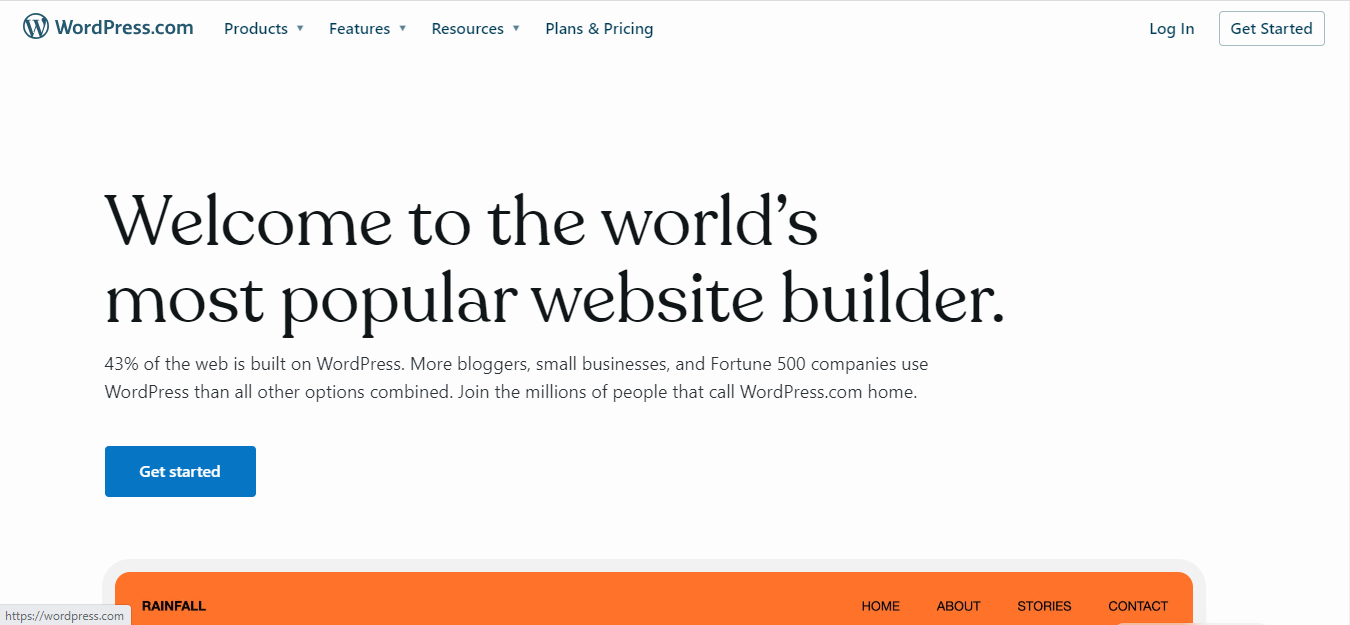Why You Should Learn How WordPress Works?
How does WordPress work? This question has crossed the minds of many individuals seeking to create their own websites or manage online content effectively.
WordPress has become a dominant force in the world of website creation and content management.
Powering over 40% of all websites on the internet, WordPress provides a user-friendly and flexible platform for individuals and businesses alike.
In this article, we’ll delve into the inner workings of WordPress and explore the key components that make it such a popular and powerful content management system.
Why You Should Learn How WordPress Works?
Empowerment and Independence

Learning how WordPress works gives you the ability to create, customize, and manage your own website without relying on others.
It empowers you to take control of your online presence and make changes as needed, saving time and money in the long run.
Flexibility and Customization

Understanding the inner workings of WordPress allows you to fully customize your website.
You can choose from a wide range of themes, design elements, and plugins to create a unique and tailored online platform that aligns with your brand or personal style.
Career Opportunities

WordPress powers a significant portion of the internet, and having in-depth knowledge of how it works opens up various career opportunities.
You can pursue roles as a web designer, developer, content manager, or even start your own web design and development business, capitalizing on the widespread usage of WordPress.
Efficient Website Management

Knowing how WordPress functions enables you to efficiently manage and maintain your website.
You can troubleshoot issues, perform updates, optimize performance, and implement security measures effectively, ensuring your site runs smoothly and remains secure.
Collaboration and Communication

If you work with web developers or designers, having a solid understanding of WordPress allows for better collaboration and communication.
You can effectively convey your requirements, understand their suggestions, and actively participate in discussions, resulting in a more successful website project.
Stay Updated with Technology

WordPress evolves continuously, introducing new features, improvements, and security measures.
By learning how WordPress works, you can stay updated with the latest developments and ensure your website stays relevant and up to date with industry standards.
Expand Your Digital Skills

Understanding WordPress goes beyond managing a website.
It introduces you to concepts like content management systems, databases, web hosting, and web development principles.
These skills can be valuable in other digital projects and endeavors beyond WordPress itself.
Support and Troubleshooting

When you have a good understanding of how WordPress works, you can troubleshoot common issues on your own.
You can search for solutions, ask informed questions in support forums, and effectively communicate with technical support when needed, saving time and frustration.
Enhance User Experience

By knowing how WordPress functions, you can optimize your website’s user experience.
You can implement responsive designs, improve page loading times, and ensure smooth navigation, providing visitors with a seamless and enjoyable interaction with your site.
Continuous Growth and Learning

Learning how WordPress works is a continuous journey.
As you delve deeper into its features and functionality, you open doors to new possibilities, learning opportunities, and the ability to adapt to changing trends in web development.
In conclusion, learning how WordPress works provides you with the knowledge and skills to take charge of your website, opens up career opportunities, and allows you to create a personalized online presence.
It equips you with the ability to efficiently manage your website, collaborate effectively, and stay updated with the latest technologies.
So, dive into learning WordPress and unlock the potential to build remarkable websites and expand your digital horizons.
What is WordPress?
Content Management System

At the heart of WordPress lies its core software.
The WordPress core is an open-source content management system (CMS) written primarily in PHP programming language.
It provides a framework that enables the creation and management of websites, allowing users to easily publish and organize their content.
WordPress Themes

One of the defining features of WordPress is its extensive theme system.
Themes control the visual appearance of a website, including its layout, color scheme, typography, and other design elements.
Users can choose from a wide range of free and premium themes to customize the look and feel of their websites.
Themes make it possible for WordPress to cater to various industries, such as blogging, e-commerce, portfolios, and more.
Plugins

Another crucial aspect of WordPress is its vast ecosystem of plugins and themes.
Plugins are add-ons that enhance the functionality of a WordPress website.
They can be used to add features like contact forms, SEO optimization, social media integration, security enhancements, and much more.
The plugin architecture allows users to extend the capabilities of their websites without having to write custom code.
Database and Content Management

WordPress relies on a MySQL database to store and manage website content.
The database holds information such as posts, pages, comments, user profiles, and settings.
When a user creates or edits content, such as writing a blog post or updating a page, the changes are stored in the database.
User Management and Authentication

WordPress provides a robust user management system that allows website owners to control access and permissions for different user roles.
It supports multiple user roles, including administrators, editors, authors, contributors, and subscribers.
Each role has specific capabilities and restrictions, ensuring a secure and controlled environment.
Frontend and Backend

WordPress operates with a separation of the frontend and backend.
The frontend is what visitors see when they access a website, while the backend, also known as the admin dashboard, is where users manage and customize the website.
The backend provides an intuitive interface for users to create and edit content, install themes and plugins, configure settings, and perform other administrative tasks.
Customization and Extensibility

WordPress’s true power lies in its flexibility and extensibility.
Developers can create custom themes and plugins to tailor WordPress websites to specific needs.
The WordPress API (Application Programming Interface) allows developers to interact with WordPress and build custom functionality.
This extensibility has contributed to the vast ecosystem of themes and plugins, making WordPress highly adaptable and capable of accommodating a wide range of use cases.
How Does WordPress Work?
WordPress is a powerful content management system (CMS) that enables individuals and businesses to create and manage websites.
Understanding how WordPress works involves exploring its key components and the processes that take place behind the scenes.
Here’s a breakdown of how WordPress functions:
Install WordPress

To use WordPress, you need to install it on a web server.
Most web hosting providers offer one-click installation options for WordPress, simplifying the setup process.
During installation, you provide basic information such as the site title, admin username, password, and email address.
File Structure

Once installed, WordPress creates a directory structure on the server.
This structure includes core files, theme files, and plugin files.
The core files make up the foundation of WordPress, containing the PHP scripts and libraries that power the CMS.
Database

WordPress relies on a database, typically MySQL, to store and manage website content.
The database stores information such as posts, web pages used, comments, user details, and site settings.
When you create or modify content, WordPress interacts with the database to retrieve and update the relevant data.
Updates and Maintenance

WordPress regularly releases updates to improve security, fix bugs, and introduce new features.
It’s crucial to keep WordPress, themes, and plugins up to date to maintain a secure and stable website.
Regular backups, security measures, and performance optimizations are also essential for ongoing maintenance.
In conclusion, WordPress operates as a dynamic CMS that leverages PHP scripts, a database, themes, and plugins to create and manage websites.
Its user-friendly interface, extensive customization options, and vibrant ecosystem of themes and plugins have contributed to its widespread popularity as a go-to platform for website development and content management.
What is a host?

In the context of websites, a host refers to a web hosting provider or a web server that stores and delivers the files and data associated with a website.
Web hosting is a service that allows individuals and organizations to make their websites accessible on the internet.
When you create a website, it consists of various files, including HTML, CSS, JavaScript, images, and other media.
These files need to be stored on a server that is connected to the internet so that they can be accessed by anyone visiting your website.
A web host provides the necessary infrastructure and services to store your website’s files and make them available to internet users.
They allocate disk space on their servers to store your website’s data and also provide other resources like bandwidth, server hardware, security measures, and technical support.
When a user types your website’s domain name or clicks on a link to your site, their web browser sends a request to the web host’s server.
The server then retrieves the relevant files and data associated with your website and sends them back to the user’s browser, which renders and displays the website.
Web hosting providers offer different types of hosting plans to accommodate various needs and budgets.
Some common types of hosting include:
Shared Hosting

Multiple websites are hosted on the same server, sharing its resources. It is an affordable option suitable for small and medium-sized business websites.
VPS (Virtual Private Server) Hosting

A physical server is divided into virtual private servers, providing more control and resources compared to shared hosting.
Dedicated Hosting

You have an entire physical server dedicated exclusively to your website.
It offers maximum control, performance, and flexibility but is generally more expensive.
Cloud Hosting

Your website’s files and data are distributed across multiple interconnected servers, ensuring scalability and high availability.
Managed WordPress Hosting

Hosting specifically optimized for WordPress websites, offering features such as automatic updates, enhanced security, and specialized support.
Choosing a reliable web hosting provider is crucial as it impacts your website’s performance, uptime, security, and user experience.
Factors to consider when selecting a host include server reliability, customer support, scalability, pricing, available features, and the specific needs of your website.
Overall, a web host plays a vital role in making your website accessible on the internet by storing and serving its website files, and data to visitors.
WordPress.org vs. WordPress.com
WordPress.org and WordPress.com are two different platforms that are both associated with WordPress but offer distinct features and functionalities.
Let’s explore the differences between them:
WordPress.org

Self-Hosted
With WordPress.org, you have complete control over your website.
You need to download and install the WordPress software on a web hosting server of your choice.
Flexibility
You can fully customize your website by installing custom themes and plugins, modifying the code, and accessing the the website builder’s database.
Themes and Plugins
You have access to a vast collection of free and premium themes and plugins from various sources, allowing you to extend the functionality and design of your website.
Monetization
WordPress.org allows you to monetize your website freely, whether it’s through advertisements, e-commerce, or other means.
Cost
While the WordPress software itself is free, you need to pay for web hosting and a domain name to have your website up and running.
WordPress.com

Hosted Solution
With WordPress.com, your website is hosted on their servers, and you don’t need to worry about finding separate hosting or dealing with technical aspects.
Simplicity
WordPress.com offers a more user-friendly and streamlined experience, making it easier to set up and manage a website, especially for beginners.
Limited Customization
The customization options on WordPress.com are more limited compared to self-hosted WordPress.
You can choose from a selection of pre-designed themes, but you cannot install custom themes or access the website’s code.
Plugins
WordPress.com has a curated collection of free plugins, and you can only use them based on the plan you subscribe to.
Custom plugins or the ability to upload your own are not available on all plans.
Monetization Restrictions
Free and lower-tier plans on WordPress.com have limitations on monetization options, such as displaying ads.
To unlock more monetization features, you need to upgrade to a higher-tier paid plan.
Choosing between WordPress.org and WordPress.com depends on your specific needs and preferences.
If you value full control, customization options, and the ability to monetize your website freely, WordPress.org is the better choice.
However, if you prefer a simpler setup process, don’t want to deal with technical aspects, and are willing to accept some limitations on customization and monetization, WordPress.com can be a suitable option.
Ultimately, it’s important to evaluate your requirements, technical expertise, budget, and long-term goals to make an informed decision about which WordPress platform aligns best with your needs.
Conclusion
WordPress is more than just a website creation tool—it’s a robust content management system that empowers individuals and businesses to build and manage their online presence.
By understanding the inner workings of WordPress, from its core software to themes, plugins, and database management, users can fully leverage its capabilities to create dynamic and engaging websites.
Whether you’re a blogger, an e-commerce entrepreneur, or a professional looking to establish an online portfolio, WordPress provides a versatile platform that continues to shape the web development landscape.
If you liked this article, consider reading another about Installing WordPress here.
FAQ
The steps to create a WordPress site from scratch are as follows:
1.Choose a domain name and register it with a domain registrar.
2.Sign up for web hosting and select a hosting plan that suits your needs.
3.Install WordPress on your hosting server, either manually or through a one-click installation option.
4.Select and customize a WordPress theme that matches your website’s design and functionality requirements.
5.Install essential plugins to enhance your site’s features and performance.
6.Create and organize your website’s content by adding pages, blog posts, and media.
7.Configure site settings, including permalinks, site title, and tagline.
8.Optimize your site for search engines by using SEO best practices and installing an SEO plugin.
9.Implement necessary security measures, such as strong passwords, regular updates, and backups.
10.Launch your website and regularly update and maintain it to ensure optimal performance and security.
